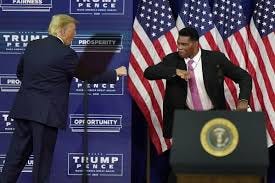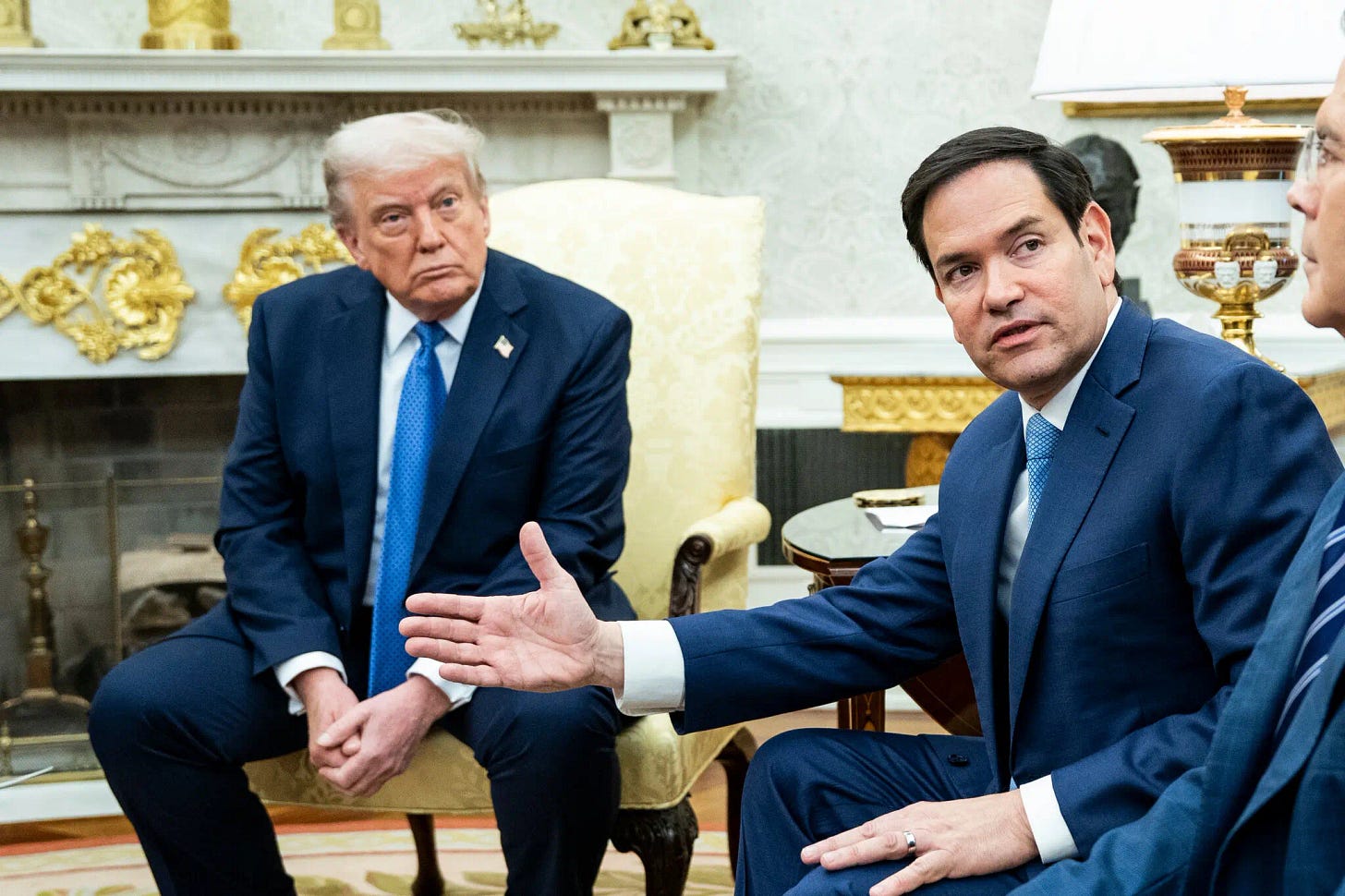More foreign affairs in a crazy, mixed-up world
Filling ambassadorial ranks with amateurs--with fewer qualified backups: a rookie move by a distracted president and worse, a misguided Senate
It is any president’s right, however misguided, to choose as many political appointees as ambassadors as he feels like. But our current president is making a terrible miscalculation—and no one is willing to tell him how counterproductive this pointless strategy is going to be in the long run. Or even in the short run.
Since he won the November election, the Troll King has nominated at least 55 new U.S. ambassadors—ranging from mediocre, for the most part, to just plain awful—who seem curiously unsuited, as a group, to service abroad representing the intersts of the United States. A handful of them served during his first administration, if without distinction; the rest are a sad mixture of cronies, billionaires, failed politicians, and one former TV “personality.”
To date, not a single career Foreign Service Officer has been nominated—with no indication when the first one might be chosen. During his first term, Trump did see fit to select about 57 percent of his nominees from the ranks of the Senior Foreign Service—the lowest proportion since President Gerald Ford’s 62 percent, but this time around, his flying fickle finger of fate needle could well drop below 50 percent—and perhaps even to zero. [See “Ambassadors appointed by Donald Trump, 2025,” https://ballotpedia.org/Ambassadors_appointed_by_Donald_Trump,_2025 .]
How much of a difference will this make in U.S. foreign affairs? That depends on how closely you look at the nominees chosen so far—and on a few other related factors that are slowly unfolding in Washington, D.C., such as the unprecedented rate of retirements among those career officers he might have chosen.
It is worth noting that twice as many State Department employees have retired since January—about 1,800—than the annual average, while those high-ranking FSOs whose offices are being closed down are caught in a vicious Catch 22, not allowed to seek a transfer and not sure whether they might simply be fired for not working. [See “Foreign Service officers in limbo,” June 18, https://federalnewsnetwork.com/workforce/2025/06/foreign-service-officers-in-limbo-with-state-dept-rifs-on-hold/ .]
A page back in time ... is a reader-supported publication.
To receive new posts and support my work,
consider becoming a free or paid subscriber.
* * * * * * * *
As a “reformed” Foreign Service Officer—I walked away from the U.S. State Department in 1997—I keep my eyes out for unusual and outrageous events occurring in countries of interest to the United States, particularly those I have served in or visited. This often includes analyses of U.S. actions affecting those countries, whether wise or effective—or neither, as here—and in many recent cases, more puzzling than practical.
During my career, I served at a total of seven foreign posts, under a total of six ambassadors—half career, half political appointees (one post was vacant during my brief regional tenure serving Brunei). Being an administrative officer, I was often called upon to enforce unpopular State Department regulations, and frankly found my job less onerous under the political appointees—who deferred on most matters to their second-in-commands, the DCMs (deputy chiefs of mission), who understood the system and often had some actual management experience.
You might think the career ambassadors would have known better, but no—those under whom I served were often far more impatient with rules than anyone else, and enjoyed making your life miserable until you found a way “around” pesky restrictions regarding their housing and travel. Under political appointees, the DCMs were at least in a stronger bargaining position, and often able to help admin officers figure out whatever compromise might save the day.
The Senior Foreign Service is relatively small, representing the “cream of the crop”—those FSOs who were promoted, on average, faster than their counterparts, generally on the basis of superior performance and stronger performance evaluations (called EERs). It is a highly competitive process, often ruthlessly so—up or out, as in the military. Mandatory retirement for most comes at age 65; many weary of the struggle far earlier, choosing to retire after a minimum of 20 years and reaching age 55.
While exact current figures are not available, certainly fewer than 10 percent of the FSO ranks (nearly 8,000 in 2020) typically survive a 25-to-30 year career long enough to make it into the SFS. The fact that there are even fewer to choose from this time around—perhaps 400 retired this spring, rather than wait to see what opportunities Trump II brought—should not make those chosen any less suitable, if marginally less experienced than before.
But there is a hidden danger: even fewer experienced career officers to choose from as DCMs under the raft of political appointees, the ones who will actually run the embassies while their political bosses attend cocktail parties and fret over redecorating their shabby residences.
According to a May report by Politico, the astounding number of empty ambassador posts—100 at that time—was disturbing, even though the usually lackadaiscal Senate was acting faster than usual to fill some of the vacancies.
“That has alarmed veteran senior diplomats and national security officials who argue that prolonged empty posts could have far-reaching adverse effects on U.S. foreign policy. Ambassadors play key roles in shoring up U.S. alliances, gaining access to foreign governments to advance U.S. commercial interests and helping counter the growing clout of China and other geopolitical adversaries worldwide.
“That has serious ripple effects abroad: Empty ambassador posts leave U.S. embassies punching below their weight and open avenues for U.S. adversaries like China to move in and expand their own clout and influence.” [See “Empty ambassador posts alarm natsec vets,” May 12, https://www.politico.com/newsletters/national-security-daily/2025/05/12/empty-ambassador-posts-alarm-natsec-vets-00341701 .]
By this week, a total of just 12 new ambassadors had been confirmed by Thune’s Senate after vetting by Jim Risch’s Foreign Relations Committee. That the process seems “stuck” does not seem to bother either Thune or Risch of Idaho, who at 82 is among the oldest chairmen ever—the oldest since Jesse Helms left, at least, in 2001—and seemingly more concerned with other political issues than overseeing the confirmation process.
Among the 12 confirmed so far include a convicted felon—Charles Kushner, ambassador to France, whom Trump graciously pardoned in his first term, as a Hanukkah favor to his son-in-law; a born-again former Arkansas governor who once ran against Trump for president, Mike Huckabee, as ambassador to Israel; and two former members of Congress who drew the shortest straws in Trump’s on-again/off-again game of diplomatic whack-a-mole: ex-Senator David Perdue of Georgia, now the luckless ambassador to China, and Pete Hoekstra, a former House member—and onetime U.S. ambassador to the Netherlands—given the particularly thankless job of ambassador to Canada, which no one in his right mind would want under Trump.
It wouldn’t be so bad, I suppose, if the countries where fulltime ambassadors are needed the most weren’t the ones being delayed or ignored.
Among those unlucky ones still awaiting a named political appointee include erstwhile ally Denmark, where Kenneth Howery (former ambassador to Sweden) must become the public face of a very unpopular foreign policy dispute over Greenland; South Africa, where right-wing icon Brent Bozell could conceivably be bounced back before he can even get to show his credentials, after South Africa’s last U.S. ambassador was PNG-ed over unflattering remarks made about Elon Musk shortly after Miniscule Marco took over at State; and Greece, where Kimberly Guilfoyle—Trump’s son’s discarded paramour, whose badly-besmirched personal reputation may soon earn her unrepeatably graphic nicknames—will struggle to cultivate a staunch U.S. ally more accustomed to serious diplomats than fly-by-night floozies. Perhaps inspiring a remake of Melina Mercouri’s most famous movie, Never on Sunday …
Herschel Walker attempting an awkward elbow-bump. Courtesy AP
Or The Bahamas, under relentless recent attack by Marco Rubio over the Cuban medical issue, which richly deserved a thoughtful and deferential ambassador, but must wait now for a gridiron clown: none other than failed Georgia Senate candidate Herschel Walker, whose inarticulate campaign gibberish and scandal-ridden past did nothing to dispel rumors that he regularly forgot to wear a helmet (or an athletic supporter) during his years on the football field.
Who’s driving this clown car? Courtesy James Bruno, “Dispatches from Exile.”
My artful colleague, former FSO James Bruno, may be onto something in his recent Substack entry on “Trump’s Diplomatic clown car.” [See “Dispatches from Exile,” May 22.]
Those four embassies are currently under the careful leadership of an experienced charge d’affairs, a DCM, all caretakers since the last ambassadors submitted their resignations to Trump in January. (Unlike previous presidents, Trump short-sightedly accepted all resignations immediately, rather than allow career appointees to stay on and bridge the gap.) But the DCMs have no guarantee of continued service once their new bosses arrive—and many may simply choose to file for retirement, given the chaotic state of affairs at Main State under Rubio.
I’ve got it under control, thinks Miniscule Marco—but Trump not so sure. Photo courtesy New York Times
But what of the other 100-plus embassies where no ambassador has yet been named (or even thought of)? Countries that for years have depended upon skilled guidance by career diplomats familiar with both the issues and the histories and cultures of the countries they serve, to steer a calm course through troubled waters while prudently implementing whatever erratic policy the administration adopted.
Have we given any sustained thought to why we might benefit from a little wisdom there instead of empty-headed, grinning fools bragging about how much money they gave …
Such as idyllic Barbados, which acts as the regional embassy for seven different Caribbean nations—including four other countries suddenly under Rubio’s gun for inexplicably amped-up travel restrictions (Antigua and Barbuda, Dominica, St. Kitts and Nevis, and St. Lucia)—and coincidentally, the home of the very vocal Caricom chairman, Prime Minister Mia Mottley, who has openly dared Rubio to revoke her U.S. visa. No longer just a tourist paradise, but increasingly a country with clout.
Can we really afford to alienate proud little Barbados, an outsized voice in an increasingly disaffected region we pretend we want to cultivate? [See “Trump administration weighs adding 36,” June 16, https://www.reuters.com/world/us/trump-administration-weighs-adding-36-countries-travel-ban-memo-says-2025-06-15/ .]
Or for that matter, Jamaica, once our strongest ally in the Caribbean—whose embattled JLP Prime Minister, Andrew Holness, faces a do-or-die election in September? Don’t we desperately need a resident ambassador there? Or do we prefer to continue browbeating him long-distance over his willingness to accept much-needed Cuban medical personnel—and simply abandon him in his hour of need? Do we really want the far-left PNP to take over again?
Or pathetic Haiti, now wracked by murderous unrest, under a sudden, complete travel ban for reasons no one can adequately explain—and forced to grovel for attention as hundreds of thousands of its nationals face imminent deportation. Who can Haitian government officials turn to for advice and counsel?
Or Suriname, where Miniscule Marco foolishly placed all his chips on losing presidential candidate Chan Santokhi, bested in parliamentary elections in May by a formidable opposition candidate Rubio breezily insulted by ignoring during his brief visit in March. The country’s first female president may soon be sworn in once the dust settles—and will almost certainly pursue a course far different from the old-boy network of her predecessor.
Or Guyana, where Rubio unwisely promised U.S. military assistance against evil neighbor Venezuela—and then brushed off the temporarily-friendly president, Irfaan Ali, by mocking the condition of roads he assumed were built by the Chinese, but were actually the work of local engineers. Before Rubio’s pointlessly counterproductive visit, many Guyanese were openly calling for extra-continental annexation by the United States as the 51st state (sorry, Canada)—but may now change their minds before the September presidential election.
All are countries of “color,” incidentally—not immediately congenial on the totem pole of the Troll King’s white nationalist MAGA supporters with deep pockets.
Or for that matter, anywhere in (black) Africa? Just three other countries there—two along the Mediterranean coast—had received even the courtesy of a nomination by mid-June: Tunisia, Morocco, and Namibia. Do we simply plan to abandon the entire continent between the Sahara and South Africa?
Or Ukraine, where the U.S. ambassador to Cyprus has now been seconded to pull double-duty—as charge d’affaires in desperate, wartime Kyiv, under siege daily from Russian missiles and drones—while Trump still dreams of the Nobel Peace Prize that got away and contemplates pulling the plug on the entire country …
Who, if anyone, will we send to any of these nations next? These important but less-than-comfortable countries no wealthy donor or sycophant, or even a misguided dilettante, would willingly accept under the circumstances—because work might be expected? Perhaps we will simply leave them vacant, therby subtly informing the leaders and the people of those countries that they count for very little in the greater scheme of things in Trump’s New World Order. We could, of course, shut those embassies down to save money—and relinquish influence to China, who is eager to step in.
I fear, at my core, that the Rubio-Trump campaign to eviscerate the State Department is reaching a point of no return. The announced goal of cutting the work force there by 20 percent may only be the start, after leveling USAID. Replacing the retired and fired employees of yesteryear with Trump loyalists could usher in a new Dark Ages of sorts—folks with more money than brains—and absolutely no finesse. Led defiantly by addled and angry fools like Karoline Leavitt, who know nothing and prove that loudly every day, insulting the intelligence of everyone they meet by simply out-shouting them with empty-headed, parroted words, and wondering why no one listens.
It is becoming increasingly apparent that prudence is unfashionable in choosing America’s representatives to the world—to preside over gutted embassies manned by recorded message machines singing Trump’s praises, or playing Kristi Noem’s nauseating TV commercials on an endless loop on gold-plated screens in the parking lot, warning of the next wave of deportees.
If that is true, as I fear, I feel sudden despair for our future as a world leader.
Next time: More foreign affairs in a crazy, mixed-up world






